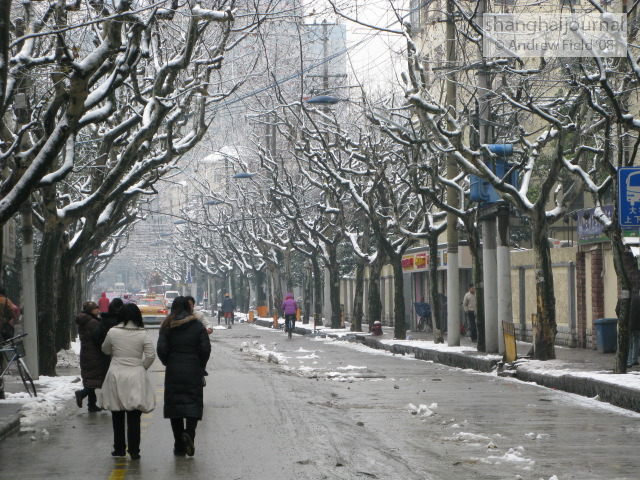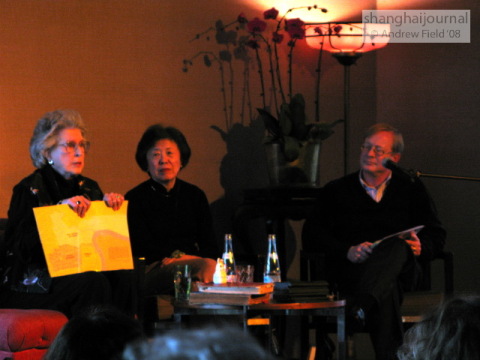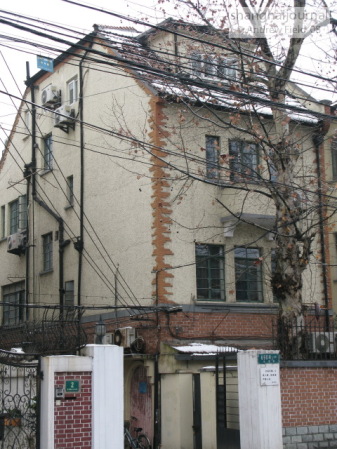
Shanghai can be a cold place in winter. Unlike Beijing, there’s no central heating, so people have to rely on space heaters to keep warm. Or by piling on lots of warm clothing. Or warm bodies. Whatever method you choose, winter in Shanghai is still a rough ride.
This is the first winter I’ve spent here since ’98. I had forgotten how bleak the city can be this time of year. To top it off, this winter has been especially brutal, not just for Shanghai but for all of China. Over the past week I’ve seen something I’d never witnessed before here in Shanghai: snow. I’d heard of an occasional sprinkle, but the cold white substance has been piling up all week, though it usually gets melted down by the end of the day, at least on the city streets. People are even making snowmen! Kids are witnessing snow for the first time! I have to admit that the snowfall has cheered me up a bit.
For better or worse, I am now a permanent resident of Shanghai. This is the first time I have come here to live for an undetermined amount of time. Basically what happened was that last fall, while I was leading the Dartmouth program in Beijing, my wife was offered a job with the new International Channel in Shanghai (ICS for short). She decided to stay here to take up the job. I then had the option of returning to Sydney for six months at a time, and having to deal with the hassle of renting apartments and moving back and forth--i.e. the usual international commuter marriage deal. Not for me. I decided finally that family trumps job (or to put it another way, my wife's job trumps mine), and that I’d rather be spending time with my wife and three-year-old daughter in freezing cold Shanghai than enjoying the beaches of the warm Sydney summer. Call me crazy, but that’s what I chose.
So I’ve cast off the Australian anchor and steered my ship into the choppy waters of Shanghai once again. Fortunately I had some connections here with local study abroad programs. I’ve taught for the CIEE program here before, and since they are always on the lookout for itinerant academics, it was no problem securing a stable teaching job. Starting in late Feb, I’ll be teaching two courses for CIEE, one on Modern China (1600-present) and one on the history of Shanghai.
Meanwhile, the man who used to run CIEE’s program here, my old Columbia colleague Shi Mingzheng, now runs NYU in Shanghai. He has big plans for the program, which is growing by leaps and bounds. We’ve worked out a deal where I’m teaching one course per semester, also on Modern China, and serving as a research associate and co-organizer of some of NYU’s activities here. This also gives me access to the NYU in Shanghai office and to the same sorts of online research resources that I would have at a major university (i.e. NYU). This teaching schedule of nine hours per week is a bit less than I'm used to at UNSW (not to mention a smaller number of students) and leaves me with the time and resources I need to continue working on my own research and writing projects, namely, my book on Old Shanghai nightlife to be published later this year, I hope, out of Chinese University of Hong Kong Press, as well as other projects too numerous and too nascent to mention.
So it’s goodbye sunny Sydney and hello cold, snowy Shanghai. Ah, but ain’t the northern hemisphere a whole lot interesting than those sunny southern climes?
Seriously though, lately I’ve been pining for the life we’ve given up. Missing those beach runs, cliff walks, that beautiful harbour, and the relaxing sanity of Australian life. Not to mention all that great cuisine, fine wine, and the friends we made during our five-year stay (especially Tim and Karen, who designed this website!). Hopefully we’ll be able to visit now and then. I’d be happy to get away from the next Shanghai winter and hang out on Bondi or Coogee or Bronte or Tamarama or Clovelly Beach for a few weeks. Then again, being in Shanghai gives one access to the riches of East and Southeast Asia. Thailand is a whole lot closer now, as are the Philippines. Too bad I don’t have the cash to burn and too bad my wife doesn’t have the vacation time to enjoy Asia’s wealth of pleasure spots.
So one makes due with snowy Shanghai. What is there to do on a cold winter day or a bone-chilling night? Besides watching pirated DVDs? Well, here are a few things I’ve done in the past couple weeks to catch up with the city’s vibrant international culture.
Milk and Fashion at the Paramount Ballroom
Two weeks ago on Thursday night I attended the launching party for a new film called “Milk and Fashion,” whose story takes place in Shanghai. The party was held at the Paramount Ballroom in the disco lounge space, which used to be Shanghai’s most elegant and modern ballroom back in the 1930s (see my short film on the history of the Paramount Ballroom). I was expecting a small, exclusive set of people involved in the film project, but instead the place was jam-packed with a mixture of Chinese and foreigners, many of whom looked like they were there just for the free food. I ended up spending the evening in the VIP room, also terribly crowded, with a few friends who were involved in financing the production, drinking glasses of decent red wine and chatting with erstwhile movie producers. Turns out there’s a lot of interest in, and a fair amount of money for, making films in Shanghai for an international audience. I may become involved in such a venture in the future, but for now will keep it hush hush.
Live Music at the Melting Pot
On Monday night last week I braved the icy weather to meet my old friend Jud Wilmott at Taikang Road, a small street in the southern part of the old French Concession lined with cafes, bars, clubs, and art galleries. We went there to drink beer, talk about film, and listen to a greasy, long-haired, horn-rimmed glasses sporting, toothy-grinned Chinese guitarist named Zhou Chao, who was playing at the Melting Pot (288 Taikang Road) one of the few remaining live music houses in Shanghai. But before Zhou played his energetic Jimmy Hendrix-style blues slide guitar, several other acts came on stage. Turns out it was improv night and anybody was welcome onstage. A young American woman played some of her own songs accompanied by acoustic guitar. She was followed by an American guy, somewhat older and larger in the waist, who played and sang a few country-western style tunes on the same guitar, accompanied by two Chinese musicians, one on mandolin and the other on banjo. I’d never seen that before in China. Then a Cuban salsa band got onstage and played some dance tunes (nobody was dancing though, it was a pretty sedate crowd), and finally Zhou Chao got up there and ripped out a few hard-driving blues improvisations, accompanied by a Chinese bassist. It was good to get back into a live music scene, even if it didn’t match the energy or vitality of Beijing’s scene.
Hard-Fi and Smirnoff: A Watery Mix
The next big party I attended was also a live music event, held last Saturday night on West Huaihai Road in the Shanghai Sculpture Space, a large cavernous warehouse. This party was hosted by Smirnoff and featured an international DJ (forget the name) as well as a band from London called Hard-Fi. It took us a while to find the entrance. Once inside my wife and discovered a large crowd of mostly Chinese. Everyone had their coats on since there was no heating and the place was freezing. This was all surprising, as the party had been touted as an “invite only” affair and we were expecting a more exclusive crowd and a nicer setting for the concert. We were given three free drinks, but I swear that the bottles of Smirnoff the bartenders were pouring were actually water. The band was just as watered down as the drinks. I could see this sort of band doing well in a teeny bopper environment. The words “derivative,” “contrived,” and “formulaic” came to mind as these good-looking London lads pumped out a few tunes. I found myself pining for the bands and fans of Beijing’s indie scene. Well, musical taste is subjective, and my back and shoulders were hurting from chronic condition that flairs up now and then, so I was in a bad mood to begin with, plus there was no alcohol in my system, and I didn't know anybody in the crowd. But other people at the party seemed to be having a fun time. Some people were even--and I cringe to think of it--dancing to the music. Upon making a quick and early retreat, we also noticed that the exit wasn’t clearly marked--and the vision of a mad stampede following some electrical accident passed through my mind as we retreated out the door past a line of smelly portapotties.
Old Shanghai and New Shanghailanders at the Glamour Bar on the Bund

On Sunday arvo (see, I’m still preserving a bit of Aussie culture), I headed to the posh Glamour Bar at 4 pm for a talk by the locally famous trio of Old Shanghai buffs, Lynn Pann, Tess Johnston, and Patrick Cranley. The place was packed with neo-Shanghailanders, mostly expats but quite a few Chinese. People were elegantly dressed, especially the stately matrons of the Shanghai expat scene. I missed most of Lynn’s talk on Shanghairen, only to catch her mention the importance of late Qing courtesans and the Suzhou dialect to the Shanghai identity (which Catherine Yeh’s book Shanghai Love captures very well). Tess followed with a short talk on the types of foreigners who once inhabited the city, with a special emphasis on the Russians and Jews (which Marcia Ristaino’s book Port of Last Resort covers with great thoroughness), while Patrick devoted his brief talk to the “interlopers” and adventurers, not to mention prostitutes and other sorts of folk who gave the city its decadent colors (if you want to get a taste of this kind of story, read Robert Bickers, Empire Made Me). While I couldn't rightly say that they were delivering wholly original material, it was a fun set of talks, well delivered, and it was obvious from the size of the audience and the questions that followed that Old Shanghai continues to hold a great fascination for the new cast of interlopers who have made the city their temporary or permanent home.
At the end of the question-answer session, one damn fool even asked Lynn to recapitulate her argument about Shanghairen identity (Not sure but I think it might have been me). The event was winding up and Lynn didn’t have time to deliver the answer, but she later said something very interesting to me in private, which is that in her opinion, the identity of Shanghairen didn’t really take off until the 1940s. Up until that time, Chinese people in Shanghai mostly identified with their hometowns (Ningbo, Suzhou, etc.), and it was only after a new generation of people was born in raised in Shanghai following the mass migrations to the city in the early twentieth century that they began to think of themselves as Shanghairen. I’m sure this is a disputed claim (I know that Xiong Yuezhi, now head of the Shanghai Academy of Social Sciences, has researched this topic and traces the Shanghai identity back to the 19th century), but it does make some sense. One might even conjecture that it was only in the Mao years, when movement in and out of the city came to a standstill, that Shanghairen really consolidated their collective identity as such.
Lunching with Australian Architects in their Shanghai Home

Last but not least, two days ago I had lunch with my Australian colleague Anne Warr, an architecture specialist, and with her partner Tim, also an architect, in their lovely home on Yongjia Road, which as it turns out is only a hop, skip, and jump away from my office-apt on Hengshan Road, where I am presently typing away as my iTunes folder belts out old jazz and blues tunes. A few years ago they bought a four-storey apartment built in 1936 and renovated it. The results are fabulous, and I hear it might be up for rent in the future (at a price of several thousand US dollars).
By the way, Anne has recently published a book on Shanghai architecture. She also gives fine tours of the city and its old buildings:
http://www.watermarkpress.com.au/architecture/
http://www.walkshanghai.com/
Anne’s ayi cooked up an interesting and tasty lunch and we had a very civilized conversation, with Tim musing on the current state of American politics among other things. As the Chinese are fond of saying, 当局者迷旁观者清 (“those in the midst of it are lost, while those on the sidelines see clearly”).
Speaking of American politics, I’ve been trying to keep up with the presidential race on my iPod. Being of liberal orientation, I download podcasts from the BBC, NPR, and the New Yorker and follow the news every morning as I ride the subway line from Zhabei to Hengshan Road (quite a smooth commute, though crowded during rush hour). It might not mean much, but I’ve had a couple of dreams on different nights suggesting that Mrs. Clinton was elected our next president (in one dream she was jogging, just like old Bill used to do). I’m not sure why, but I have an unexplainable fondness for Bill and Hilary. Maybe it’s because back when Bill was president, people in China and Japan always used to say I looked like him. Whether in Shanghai or Tokyo, I’d be walking down the street and somebody would inevitably yell, “President Clinton!” As soon as he left office, I stopped hearing this.
Thank god I don’t resemble W.